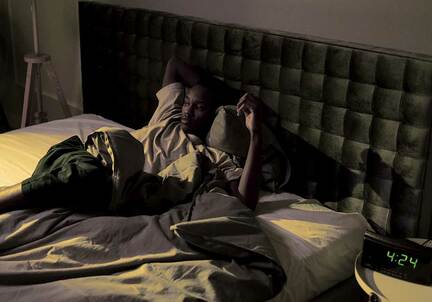
COVID-Somnia: A Pandemic-Induced Sleep Disorder
The ongoing impact of the COVID-19 pandemic is taking a toll on many people and, in many ways, is affecting their overall well-being.

While insomnia is not a defining symptom of the virus, people are having trouble sleeping due to shortness of breath, headaches, congestion, and even the persistent fear of contracting the virus.
Neurologists call this phenomenon "COVID-Somnia," a condition characterised by sleep disturbances, change in sleep patterns, and total lack of sleep directly caused by the COVID-19 pandemic.
Consequently, anxieties regarding job loss, family health, and financial insecurity have also risen, only increasing poor sleeping habits and altering the quality of sleep.
What is "COVID-Somnia?"

In order to fully understand what COVID-Somnia is, it is important to first understand what insomnia is and how it manifests.
Insomnia is a common sleep disorder, either acute or chronic, where a person experiences difficulty falling asleep, staying asleep, or even both.
There are numerous signs that you may be experiencing insomnia, such as:
Difficulty:
- Falling asleep
- Remaining asleep
- Concentrating
- Paying attention
- Sleeping w/o parent or caregiver
- Staying asleep
Feeling:
- Resistant about sleep
- Fatigued or malaise
- Hyperactive
- Impulsive
- Aggressive
- Excessively tired
Reduced/Impaired:
- Social skills
- Energy
- Motivation
- Job performance
Dr. Angela Drake, Clinical Professor of UC Davis Health, has said that "insomnia was a problem before COVID-19. Now, from what we know anecdotally, the increase [in those experiencing insomnia] is enormous."
In fact, some research regarding adults in China claimed that there had been a "37% increase in the rates of clinical insomnia (from 14.6% to 20%) from before to the peak of COVID pandemic." Clinical insomnia refers to insomnia that has been confirmed and diagnosed by a medical provider. Furthermore, a study conducted by Science Daily found that the word “insomnia” rose in Google searches by 58% within the first five months of the pandemic.
The Sleep Medicine and Disorders: International Journal states that there is a higher prevalence of insomnia in:
- Healthcare workers
- Females
- Urban citizens
- Those who frequently use the internet (more screen time, more worrying)
- Those with a previous history of medical and psychological problems
- Low-income families
- Those younger than 40
- Those with decreased physical activity
- Those who received lower education
Whether it be due to anxiety regarding the virus or a symptom of the virus, insomnia brought about by the ongoing pandemic is referred to as "COVID-Somnia." If not managed or adequately diagnosed, temporary sleep problems can develop into chronic ones, and other issues may arise, such as:
- Impaired ability to concentrate
- Poor memory
- Difficulty with family and social relationships
- Reduced quality of life
- Increased risk of having a motor vehicle accident
- Increased risk for other medical conditions and disorders
Can Lack of Sleep Lead to COVID-19?

From July 2020 to September 2020, the British Medical Journal of Nutrition Prevention & Health conducted a study to determine "whether sleep and self-reported burnout may be risk factors for COVID-19 among high-risk healthcare workers (HCWs)." The study consisted of a survey—sent to HCWs in France, Germany, Italy, Spain, UK, USA—that could be filled out online.
From there, BMJ took note of the hours of sleep each HCW was receiving amid the pandemic and found that "among 2,884 exposed HCWs, there were 568 COVID-19 cases and 2,316 controls." In short, 1 out of 5 (19.7%) health care workers within the study who experienced burnout and/or sleep complications contracted COVID-19, confirming that both contribute to greater odds of falling ill.
How to Get Better Sleep
If you're reading this piece, chances are falling asleep is already a challenge, or you know someone who is having difficulty. Insomnia only makes things more complicated. If you're having trouble falling asleep, we suggest taking some of these initial steps to improve the quality of your rest:
- Adjusting the temperature between 68 and 72 degrees Fahrenheit
- Avoiding food and drink before bed
- Eliminating distracting light and sound
- Eliminating or limiting alcohol, nicotine, and caffeine
- Eliminating stressors
- Exercising
- Ignoring the clock
- Kicking the pets and kids out of the bed
- Setting a sleep schedule and sticking to it
- Using audio-based therapies
However, you should always consult your healthcare provider before making any decisions regarding your health.

Sleeping with SleepPhones®
Amid the pandemic, sleep is one of the most beneficial activities you can do to better your health. With the proper amount of rest, you can reduce daytime fatigue, burnout, and the likelihood of falling ill. Try one of our many SleepPhones® to assist you in your journey towards more peaceful nights, or contact us today to learn more about what products we have to offer!
